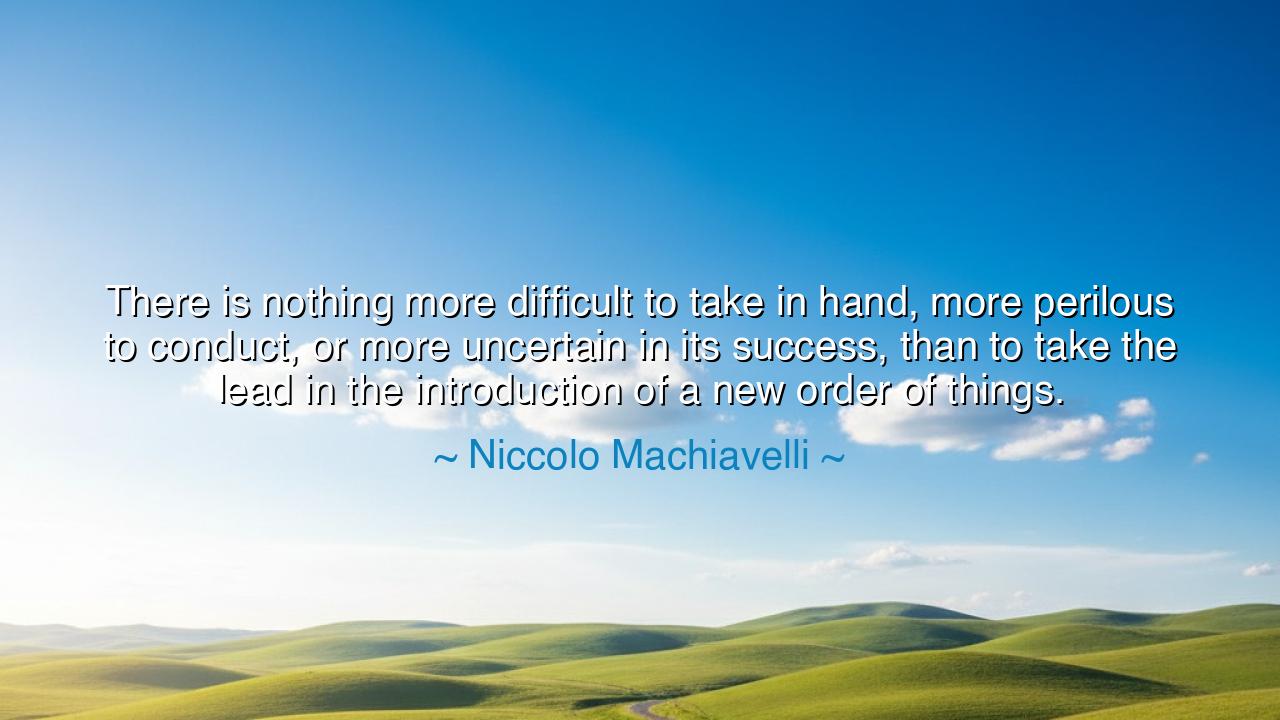
There is nothing more difficult to take in hand, more perilous
There is nothing more difficult to take in hand, more perilous to conduct, or more uncertain in its success, than to take the lead in the introduction of a new order of things.






Hear the stern wisdom of Niccolò Machiavelli, the Florentine thinker who gazed without fear into the heart of power: “There is nothing more difficult to take in hand, more perilous to conduct, or more uncertain in its success, than to take the lead in the introduction of a new order of things.” In this saying is revealed the eternal struggle of all who dare to transform the world. For to bring forth a new order is to wrestle not only with the stubborn weight of custom, but with the fear, envy, and resistance that dwell in the hearts of men.
To lead in the shaping of a new order of things is to stand at the crossroads of creation and destruction. The reformer, the innovator, the visionary—these are often greeted not with praise, but with hostility. For those who benefit from the old order cling to it with desperate hands, fearing the loss of power, wealth, or security. And those who might gain from the new are often hesitant, unable to believe in what they have not yet seen. Thus, the one who introduces change finds himself opposed both by entrenched enemies and by faint-hearted allies.
History itself testifies to the truth of Machiavelli’s words. Consider the life of Martin Luther, who nailed his Ninety-Five Theses to the church door in Wittenberg. He sought reform, but what he received was peril. The Church, whose authority was challenged, branded him a heretic. Princes wavered, and friends trembled. His cause succeeded only after years of turmoil, bloodshed, and sacrifice. Truly, there was nothing more perilous to conduct than this attempt to birth a new order of faith.
Or consider the tale of Galileo Galilei, who dared to proclaim that the earth moved around the sun. His discoveries unveiled a new order in the heavens, but his truth was greeted with chains. The guardians of tradition declared him dangerous, forcing him into silence. Though his science triumphed in the centuries that followed, he bore the burden of Machiavelli’s warning: that the path of innovation is paved with peril and uncertainty.
The meaning of this quote is not despair, but preparation. Machiavelli does not counsel that one avoid change, but that one approach it with clear eyes and steady heart. To lead in a time of transformation requires not only vision, but courage and cunning, for the dangers are many and the outcome never assured. The leader must be willing to endure hostility, betrayal, and sacrifice, knowing that only through steadfastness can a new order take root.
Therefore, beloved seeker, take this wisdom to heart. If you are called to change, do not think the path will be smooth. Expect resistance. Anticipate fear. Prepare for uncertainty. Yet do not let these terrors dissuade you, for though the road is perilous, it is also the road of greatness. The world has always been remade by those who dared to endure the storm, who bore the uncertainty for the sake of a better dawn.
Practical action lies before you: if you seek to bring change—whether in your community, your work, or even within your own soul—fortify yourself with patience and resilience. Surround yourself with allies who believe, yet do not depend on their certainty, for it may falter. Ground your cause in truth, and prepare to walk through the fire of doubt and opposition. Remember always that transformation is never easy, but it is the forge through which progress is born.
And so, hold Machiavelli’s words as a guiding star: there is nothing more difficult, more perilous, more uncertain, than leading a new order of things. Yet it is precisely in this difficulty that destiny is shaped. Those who dare to bear the burden of change become the architects of history, and their courage is remembered long after the old order has crumbled into dust.






AAdministratorAdministrator
Welcome, honored guests. Please leave a comment, we will respond soon